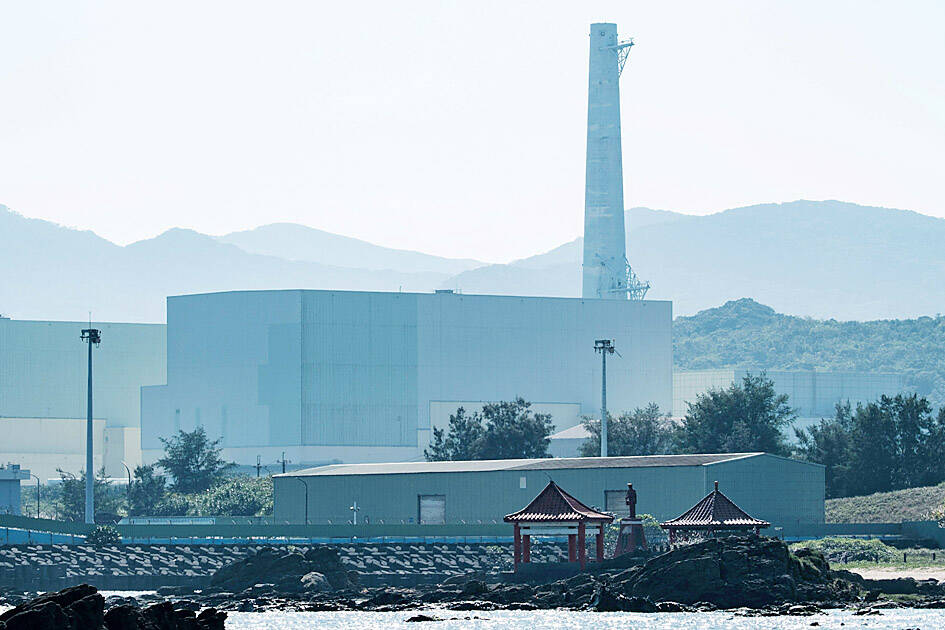GE Vernova Inc, one of the world’s biggest gas turbine makers, says Taiwan is its fastest-growing Asian market, as the nation’s plan to phase out nuclear energy forces it to rely more on fossil fuels to power its world-leading chipmaking industry.
Turning off nuclear in Taiwan “is leading to a steeper curve of replacement demand,” and “gas is the most applicable replacement to nuclear,” GE Vernova chief executive officer Scott Strazik said.
“We have a lot of opportunity in places like Taiwan that see a lot of electricity growth with chip demands in front of it,” he said in an interview in Singapore.

Photo: Yasuyoshi Chiba, AFP
Taiwan — home to the world’s biggest chipmaker, Taiwan Semiconductor Manufacturing Co (台積電) — plans to phase out its last nuclear reactor by May even as power demand is expected to rise in the coming decades. Efforts to develop offshore wind have also faced challenges as rising costs and worsening delays plague the industry, leaving the nation with fewer low-carbon energy options.
However, Taiwan remains open to using new nuclear technology, Premier Cho Jung-tai (卓榮泰) said in an interview with Bloomberg News late last year. As long as there is a consensus on safety and good waste management, Taiwan can have a public discussion about the use of nuclear power, he said.
For GE Vernova, which also makes small modular nuclear reactors, the global interest in nuclear energy represents an opportunity down the line, Strazik said.
“There’s been an incredible level of enthusiasm for new nuclear, but it’s going to take some time to materialize,” he said. “We’re very motivated with our small modular reactor technology that will be commissioned in Canada in 2029 with the first plan, and then we see it playing a more material role in the rest of the world.”
In Southeast Asia, GE Vernova, which was spun off from General Electric Co last year, sees opportunities in nations such as Malaysia and Indonesia, where gas demand is growing as more data centers are sprouting and the need for electricity is rising.

The New Taiwan dollar is on the verge of overtaking the yuan as Asia’s best carry-trade target given its lower risk of interest-rate and currency volatility. A strategy of borrowing the New Taiwan dollar to invest in higher-yielding alternatives has generated the second-highest return over the past month among Asian currencies behind the yuan, based on the Sharpe ratio that measures risk-adjusted relative returns. The New Taiwan dollar may soon replace its Chinese peer as the region’s favored carry trade tool, analysts say, citing Beijing’s efforts to support the yuan that can create wild swings in borrowing costs. In contrast,

Nvidia Corp’s demand for advanced packaging from Taiwan Semiconductor Manufacturing Co (TSMC, 台積電) remains strong though the kind of technology it needs is changing, Nvidia CEO Jensen Huang (黃仁勳) said yesterday, after he was asked whether the company was cutting orders. Nvidia’s most advanced artificial intelligence (AI) chip, Blackwell, consists of multiple chips glued together using a complex chip-on-wafer-on-substrate (CoWoS) advanced packaging technology offered by TSMC, Nvidia’s main contract chipmaker. “As we move into Blackwell, we will use largely CoWoS-L. Of course, we’re still manufacturing Hopper, and Hopper will use CowoS-S. We will also transition the CoWoS-S capacity to CoWos-L,” Huang said

Nvidia Corp CEO Jensen Huang (黃仁勳) is expected to miss the inauguration of US president-elect Donald Trump on Monday, bucking a trend among high-profile US technology leaders. Huang is visiting East Asia this week, as he typically does around the time of the Lunar New Year, a person familiar with the situation said. He has never previously attended a US presidential inauguration, said the person, who asked not to be identified, because the plans have not been announced. That makes Nvidia an exception among the most valuable technology companies, most of which are sending cofounders or CEOs to the event. That includes

VERTICAL INTEGRATION: The US fabless company’s acquisition of the data center manufacturer would not affect market competition, the Fair Trade Commission said The Fair Trade Commission has approved Advanced Micro Devices Inc’s (AMD) bid to fully acquire ZT International Group Inc for US$4.9 billion, saying it would not hamper market competition. As AMD is a fabless company that designs central processing units (CPUs) used in consumer electronics and servers, while ZT is a data center manufacturer, the vertical integration would not affect market competition, the commission said in a statement yesterday. ZT counts hyperscalers such as Microsoft Corp, Amazon.com Inc and Google among its major clients and plays a minor role in deciding the specifications of data centers, given the strong bargaining power of